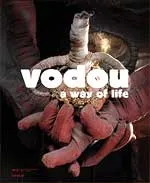Vodou, a way of life. Exhibition catalogue

Vodou, a way of life
Edited by Jacques Hainard and Philippe Mathez
Photos by Johnathan Watts
Gollion : Infolio éditions / Genève : MEG, 2008, Exhibition catalogue, 176 pages and 120 photos
ISBN 978-2-88474-140-8.
Price: CHF 25.–
Vodou – the storehouse of the slave mind, to this day the vibrant engine of resistance – is much more than a way of looking at the world. It is omnipresent in Haiti, its influence on every aspect of life giving meaning to the mundane. Marianne Lehmann, a Swiss who arrived in Port-au-Prince in 1957, has been collecting vodou objects for over 30 years. The courtyard of her house, its rooms and garden are filled to bursting with more than 3,000 items of a little-known yet surprisingly spirited material culture. Life-size figures from secret societies stand next to representations of spirits, flags of vodou nations, dreamlike figurines, immense mirrors, paquets congo, altars piled high with empty bottles, coffee cups, archaeological stones from the Taino and Arawak cultures. We are brought up short by the vast array of odds and ends used in service to the spirits, rendered speechless by the infinite creativity of Haitian artists. Saved from dispersal by Lehmann's care, the objects await suitable conditions of display to the Haitian public under the auspices of the Fondation pour la préservation, la valorisation et la production d'oeuvres culturelles haïtiennes (FPVPOCH).
The catalogue presents more than 300 pieces from Lehmann's collection on display for the first time ever, anywhere in the world, at the MEG exhibition, "Vodou, a way of life". The pictures are by Johnathan Watts, who kept to the exhibition's narrative thread. They play on variations, details, materials, accessories and group effects, kindling complex and sometimes conflicting feelings. Two interviews, one with Marianne Lehmann herself, the other with the vodou priest, the houngan Max Beauvoir, shed light on the context in which the objects were collected, while an article by Haitian anthropologist Rachel Beauvoir-Dominique (FPVPOCH) explains vodou's underlying significance : the memory of the slave crossing to the Americas and the struggle for freedom and independence – a legitimate source of pride, but also a battle that remains to be won.